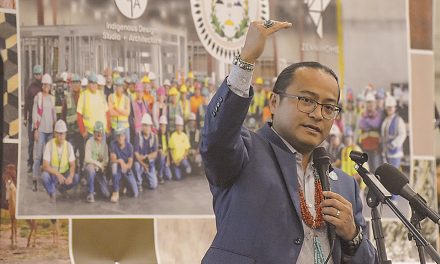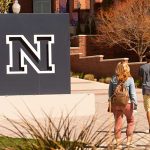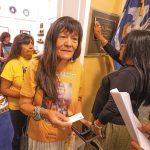
Letters: About COVID-19 and loss
I hadn’t been home in weeks. Lately I stay close to work and away from family because of the COVID-19 virus.
I got some time off a few weeks ago and decided to check on home. It was quiet because I was the only one there. So I look around and do a few things, I take my motorcycle out of the shade and do some tinkering with it. My plan was to restore it for the summer with new tires and everything, but that plan is pretty much postponed.
As I worked on it in the heat and wind, I looked over at my masani’s house about 100 or so yards from my mom’s, a gray stucco home with a cabin attached to it. That house was old, very old, built by my grandpa and grandma long before I was ever born. The door was open. I couldn’t see inside it. The inside of the house was dark, black — no one lives there anymore.
Four months ago I’d be outside doing chores and I’d see my masani sitting outside her house. She’d look over at me and wave and I’d wave back. Her large cat, Clyde, would be sitting next to her looking over at me as well. Her sheepdogs lying nearby.
She hadn’t been home for a while because she was recovering from a hospital visit. It was only temporary, or that’s what I believed. I know she didn’t like being away from her house, her cornfield, her sheep, or us. Being so far from everything.
It was morning and I just started work when I learned about her passing. I missed a phone call from my mom, but my older brother sent me a message.
At first I didn’t believe it because it seemed like he-said-she-said. After some frantic calls I finally got a hold of my mom and she confirmed it with me. She had been sick with the virus for a few weeks, but I thought she was recovering from it. There were complications, as I understand it. There is so much about the virus that we don’t understand.
She was a tough woman. Even when life was excruciatingly difficult she never let it show. The only time I ever saw her cry was when her son, my uncle, passed away years ago. We all cried though.
None of us could be there for her. As painful as it was for us when my uncle passed away at least his mom and sisters were there for him, till the very end. We could not be there for her, though, because of the virus — it took that away from us, too.
I like to think that I, and my younger brother, had a special relationship with her. After all, we grew up right across from her. She was always there. We went into the mountains with her during the summer to help her with her sheep and goats. Mornings we’d sit around the fire as she made Navajo tea and tortilla bread. She only spoke to us in Navajo, but we understood her.
She was of that generation of Indian that didn’t show too much emotion. Some took it as callous but we knew that she preferred to show her feelings through her actions. The way she prepared breakfast and dinner for us during those summer days said it all. The way she bought us Cokes and cap guns when we went with her to the trading post. How she kept us in her prayers.
I kept going to those same mountains years later. Sometimes with her and sometimes without. I’d drive her to the small convenience store in Sawmill, and she’d sit in the passenger seat of the truck. Cane in one hand and pointing to various landmarks out the window, telling me stories about those places. We’d get our stuff from the store then head back to the sheep camp.
There was plenty about her that I never understood though. Small things like why she didn’t like to have fish for dinner. Other things like when we were kids she’d take a knife and carve something into the tall red pines as we went around looking for the sheep. How she’d hang old glass bottles from shorter trees, too.
I later realized she was marking the land so it was easier to navigate. In a lot of the stories, she told me some details I never really got because I hadn’t grasped the Navajo language very well. Now I’ll never understand them. I wish I had listened more.
That was also what I have come to lose from her passing as well. A cultural legacy in our family has ended. Her stories, her ways, are gone now.
She was a weaver who made saddle blankets and rugs on her loom. She spun her own wool even in her old age. She knew legends and stories that had never been written down. Now they never will be. Every elder that is lost is a loss for our people. I realize that now.
For us, though, it’s the loss of her that hurts the most. Her house is now empty. I no longer hear KTNN radiating from her doorstep. She no longer visits my mom in the evening for coffee and conversation. Her loom sits alone with no one to work it. Her sheepdogs stay at the coral with her sheep.
Clyde the cat misses her. I see it in his wary eyes when he sits on my mom’s porch and looks across to her home. We all miss her. This land of hers will never be whole again because of this, because of the virus.
When I was a kid I remember masani telling me, “Don’t be afraid of the dark because it’s our grandmother. It watches and protects us.”
When I go back to that mountain now and I hear the wind whispering in the tall trees and the blue jays singing, I know she’s watching over us. So we watch her land for her now. As she knew me, I will always be here.
So now I finally write to anyone who reads this. Take this virus seriously. For you and your loved ones, protect yourself, because it will tear your family apart if it makes its way into your home.
Dylan Decker
Kinlichee, Ariz.
The end is not in sight
In my youth, I played for reservation dances with The Sioux Savages. After spending over 10 years in your beautiful homeland I had to accept that it wasn’t mine and so returned to Los Angeles.
Nearly 40 years have passed since my departure, and I still miss the people and their land with an ache that never seems to go away, but I have found a way to visit Dinetah just about anytime I want.
I wait until the sun has fully set in the west, go out to my car, turn the radio on and listen to one of the best stations in America: KTNN AM 660 out of Window Rock.
I ease the seat back, close my eyes and prepare to drift away into a much sweeter time. If I’m lucky it doesn’t take very long to hear what I’ve been hoping for.
The Sioux Savages playing “The End Is Not in Sight.” That great rising guitar intro by Pius Whirlwind Soldier, and away we go.
Andrew Grey of Tuba City on drums, a session player from Kentucky named Danny Baker on bass, yours truly on grand piano, and Robert W. Anslow singing with everything he’s got, like the whole of creation depends on it.
My ache turns to agony as I listen to those five young men play their hearts out for the people.
“Like a bird without a nest.
Like a stranger in the night.
And my soul cries out for rest.
And the end is not in sight.”
Such a perfect song Howard Russel Smith gave to the world. What an honor it was to be part of that moment.
Bill Crawley of Dine’ Records happened to attend our dance at the Tuba Community Center. He corralled us afterward and offered The Sioux Savages a recording contract on the spot. This was the result.
In March of 1977, we finished recording our first album and were walking out of the Phoenix studio. Pius stopped us for a second and asked the engineer if we had any time left. We did, just under an hour. He grabbed his telecaster and headed back into the control room, not the normal place to record anything.
Pius was unhappy with his guitar on “The End Is Not in Sight.” We only had eight tracks and had filled them all up on the first run, but Pius wanted something better. He would have to record over the top of his first take, erasing the original, which we thought was pretty darned good already.
Remember, he only had about 45 minutes to figure out what he wanted to create in a recording studio, an environment that was totally new to him. Pius Whirlwind Soldier always told me he loved pressure, it brought out the best in him. Is that ever true.
He ended up using the last few moments of our allotted time. And now because he risked it all, we have a truly classic guitar solo.
“Indun Blues,” he called it. “Magic,” say I.
We lost Pius several years ago, but he lives on, soaring over the radio waves into the endless, good night. I hope our song outlives us all.
Well, we recently lost another of our early members, Roy Dinedeal, our long-time bass player out of Tuba City. He joined us shortly after our first album and remained with the band for many years.
Andrew Grey called me the other night to tell me of Roy’s passing. We must have talked for an hour just remembering Roy and all the good times we had together. So now we’re down to three.
This is one of the reasons I’m writing to the Navajo Times. Andrew and I have tried for several years to find Robbie Anslow. If Rob sees this article, or someone knows him, please ask him to contact me (marty.deland@gmail.com). It may be time to create something new.
I thank the good Navajo people for one of my fondest decades.
Marty DeLand
Corona, Calif.
A pompous media event
Like Cheyenne River Sioux Chairman Harold Frazier, I am outraged by the pompous media event staged to promote President Trump’s re-election in front of a white audience whose European ancestors took away indigenous homeland of the Sioux nation and all other tribal sovereign nations and locked them up in tiny reservations.
They killed thousands, starved them, destroyed their culture, raped their women, stripped away their sovereignty, and forced them to become dependent nations. Yet many Native people danced on July 4th, Independence Day.
Whose independence was it for? Native peoples did not get to vote till only recently. What kind of independence is that?
Have we not learned the history of colonialism and doctrines of manifest destiny, and genocide committed by Americans, by this America, considered home of the free?
Here on Hopi, we are facing the death of Sípàapu, Hopi call “place of emergence to the 4th world and passage to the spirit world.”
\Hopi religious tradition is tied to Sípàapu and it is as important as Mecca is to Muslims of the Islamic faith, as important as the Vatican to the Christians.
The cause of possible death of Sípàapu is caused by non-Indian landowners, big corporations and city of Flagstaff. They have joined forces and successfully took away Hopi aboriginal rights to Little Colorado River, which feeds and sustains Sípàapu.
Desecration at Mount Rushmore, the Sioux refer to as “Six Grandfathers,” is the same as destroying Sípàapu.
In Chairman Frazier’s words, “We are looking at our molesters.” He said he’s willing to tear down the faces of four U.S. presidents, alone. He will not be alone, Native American Indians are saying “enough is enough.”
To learn about a movement to save and protect Sípàapu, visit www.blackmesatrust.org.
We need your support to keep the sacred fire burning.
Vernon Masayesva
Kykotsmovi, Ariz.
After 200 years, unite around truth of Harrison
My “hometown” of Greater Lafayette, Indiana, resides on stolen land. A land that to this day should be filled with Kickapoo, Peoria, Potawatomi, Shawnee, and Miami peoples.
On this ground, 200 years ago, the great leader Tecumseh and his spiritual brother Tenskatawa (“Open Door,” the Prophet) courageously tried to unite all tribes to protect their culture, their livelihood and their people from complete eradication by white colonialists.
At its peak in 1810, Prophetstown was home to more than 3,000 indigenous people, making it the largest Native community ever assembled in the Great Lakes territories.
Around the Battle of Tippecanoe in 1811, General William H. Harrison, who would go on to become governor of the Indiana Territory and the shortest-serving U.S. president, launched numerous destructive missions against Native villages. His “raiders” torched homes and destroyed crops to starve out and push out these originating peoples.
Harrison’s grotesque views — that Natives were bloodthirsty savages who deserved no mercy — are well documented.
Now in 2020, instead of my class of 2000 gathering in person for a reunion, a large group of alumni from 1974-06 (and growing), retired faculty, local residents, and national stakeholders in racial justice are planning to petition the Tippecanoe School Corporation to rename William H. Harrison High School and remove The Raider imagery and mascot.
Beyond his war atrocities, Harrison was an outspoken white supremacist who publicly supported the South’s reliance on enslaving black people.
Today’s resurging movement to remove monuments — vague, incomplete reminders of the past — is not just happening in the former Confederacy. The legacy of white settler colonialism from coast to coast, which led to the mass genocide of millions of indigenous people and black people, is being faced with a much more honest, enlightened telling of “history.”
This unifying effort to make the school, the community and the nation inclusive is not about removing the lessons from history. Harrison is the one who was focused on removal — removal of Natives from their land, removal of their right to life, and removal of their dignity.
What we are calling for is reconciliation and restoration. And we deeply hope you will join us by signing the petition at www.change.org/RenameHarrisonHighSchool.
Rachel (Miller) Gray
Powder Springs, Ga.
Leaders need to step up and help
An open letter to President Nez and Council delegates:
With deep sadness we write to you regarding the unbearable high number of positive COVID-19 tests across the Navajo Nation, the highest per capita rate in the entire United States.
Not only are the positive test numbers exceedingly high, we have many families who are grieving for their loved ones who have suffered and died from this virus.
The community of Mexican Water Chapter has and is continuing to suffer from the impact of the COVID-19 pandemic. To that end, Mexican Water Chapter is more than disappointed in the leadership in Window Rock, the Navajo Nation central government, as it continues to suffer from the outbreak.
While the voting public has elected the leaders to their offices to help provide for the needs within the chapter, this support has not been forthcoming. Chapters were given a Public Health Executive Order to close the chapter administration for the health and safety of the employees, yet, there was no consideration for essential services or clear communication directly to chapters. Administrative staff and elected chapter officials have an obligation to meet the needs of their community members that they serve.
When central government finally realized the impact of abruptly closing chapter services, they began identifying essential services and started asking chapters to develop COVID-19 pandemic response plans. These plans were approved by central government.
Sadly, from March 16 to the end of June 30, the Navajo Nation central government failed to provide any Personal Protective Equipment to the local chapter government staff and chapter officials to serve their community.
As “essential workers”, we were tasked with providing emergency services at the local level. The chapter administration and chapter officials stepped up and began with and continues to this day accessing available resources, reaching out to not-for-profit organizations to solicit hugely needed donations and similar required activities because nothing is coming from the central command center. We are doing the best we can, improvising to meet the needs of our community people.
Further, Mexican Water, Red Mesa, Sweetwater, Teec Nos Pos, and Aneth chapters only had one Community Health Representative assigned to work with these five communities to combat the pandemic. From the beginning of the pandemic, these five communities were never assigned any additional health workers to assist and have been without a CHR health worker for the last six years.
To date, the Navajo Nation central government has only provided fresh tomatoes, zucchini, potatoes, cantaloupe, and two cases of water on May 15 that would last for a maximum of 72 hours during this public health emergency; hardly enough to sustain our people in the remote northern portion of the Navajo Nation.
Indeed, this box of food makes us happy, but it does not address the broader needs of our community during this pandemic.
To this end, the chapter has requested and hereby reiterates its request of $2.7 million from the Navajo CARES Act Funds to help our local community in terms of health, safety and essential services directly related to COVID-19.
As the coronavirus situation continues to evolve rapidly, the safety and well-being of Mexican Water Chapter staff, volunteers and community members are a top priority. Essential workers at the chapter level need to have the protective equipment to save lives without risking their own.
Cleaning and disinfecting public spaces, meeting areas and workplaces are important to reducing the risk of exposure to COVID-19. It is essential to change the way we work, meet and gather at the chapter house and other community facilities. Modifications to our spaces and policies and procedures in these facilities are necessary.
Basic infection prevention measures, such as good hygiene and infection control practices at every home in the community, are also critical.
Replacement of deteriorated water pipes and installation of new systems are necessary for protecting human health and enabling practices at home reducing the potential for exposure or the risk of spreading COVID-19. Broadband to every home is integral to effective virtual communication with our community members as well as online learning for our students.
Mexican Water Chapter has identified 80 homes without running water and 18 homes without electricity; some of these homes have been waiting for the Indian Health Service and the Office of Environmental Health and Engineering from Kayenta and Shiprock service units to get the water pressure tested such that NTUA can begin operating the water system. Unfortunately, this request has been pending for some three to four years as the projects were to be funded using Sihasin funds.
To implement these changes in combating the COVID-19 pandemic, Mexican Water Chapter hereby strongly urges the Navajo Nation president’s office and the Navajo Nation Council to approve the direct allocation of $2.7 million as outlined in the Mexican Water Chapter Navajo CARES Fund Expenditure Plan.
It is imperative that our leaders step up and truly stand up for our communities and our people. The support of our president and Council delegates will greatly increase our resiliency and capability to respond to and recover from this contagious virus.
David John
and Mexican Water Chapter officials and staff
Mexican Water, Ariz.








 Highway 264,
Highway 264, I-40, WB @ Winslow
I-40, WB @ Winslow